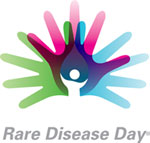
There are some cancers that virtually everyone has heard of. The month of October is awash in pink to raise awareness for breast cancer, and moustaches are everywhere in “Movember” to remind men of prostate cancer. But what about cholangiocarcinoma (bile duct cancer)? What about carcinosarcoma of the salivary gland? What about other rare cancers1 like:
- Glassy cell carcinoma of the cervix
- Mucinous adenocarcinoma of the anal canal
- Squamous carcinoma of the lip
February 29th (in leap years, February 28th in other years) is Rare Disease Day. Rare cancers are considered to be cancers which affect either less than 6 people per 100,0002 (in Europe) or less than 15 people per 100,0003 (in the United States).
Although individually each type of rare cancer impacts a small number of people, all rare cancers together account for roughly 25% of cancer cases in the United States3. That’s an awful lot of people living with a rare cancer.
Dealing with cancer is difficult for anyone, but people living with a rare cancer face some extra challenges. First of all, rare cancers are more difficult to diagnose3,4. The signs and symptoms people have may not be recognized as potential cancer symptoms, leading to a delayed diagnosis and treatment. This delay can affect how successful the treatment is.
Once a rare cancer has been diagnosed, getting treatment can also be difficult. A relatively small number of people work on developing or improving therapies for rare cancers because of the small number of people who would benefit from it. There are also fewer clinical trials for rare cancers5.
More and more people will develop cancer as the population of our country ages6. In the past, rare cancers have been even more isolating and difficult to deal with than more common cancers. But over the past few years, some great resources have been developed and there are more and more online support groups where people with rare cancers can connect.
-
orphanet has some great resources that can help people with rare diseases, including an encyclopedia of rare diseases, an assistance-to-diagnosis tool, an inventory of orphan drugs, directories of patient organizations and professionals and institutions, and a directory of ongoing research projects, clinical trials, registries and biobanks
-
RareDiseaseDay.org has information and shows you several ways to get involved
-
Rare Cancers Europe has information about rare cancers and a list of rare cancers
References:
- Surveillance of Rare Cancers in Europe, RareCareNet
- About Rare Cancers, Rare Cancers Europe
- The Occurrence of Rare Cancers in U.S. Adults, 1995–2004 Robert T. Greenlee, Marc T. Goodman, Charles F. Lynch, Charles E. Platz, Lori A. Havener, Holly L. Howe. Public Health Rep. 2010 Jan-Feb; 125(1): 28–43.
- About Rare Diseases, Orphanet
- The Burden and the Challenges of Rare Cancers, Rare Cancer Europe
- Canadian Cancer Statistics 2013, Special Topic: Liver Cancer. Canadian Cancer Society. (PDF)
